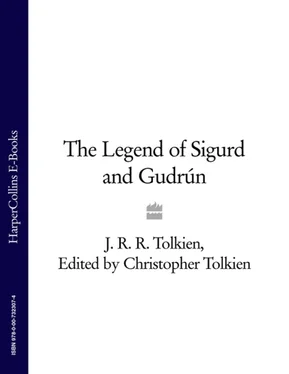J. Tolkien - The Legend of Sigurd and Gudrún
Здесь есть возможность читать онлайн «J. Tolkien - The Legend of Sigurd and Gudrún» — ознакомительный отрывок электронной книги совершенно бесплатно, а после прочтения отрывка купить полную версию. В некоторых случаях можно слушать аудио, скачать через торрент в формате fb2 и присутствует краткое содержание. Жанр: Старинная литература, на английском языке. Описание произведения, (предисловие) а так же отзывы посетителей доступны на портале библиотеки ЛибКат.
- Название:The Legend of Sigurd and Gudrún
- Автор:
- Жанр:
- Год:неизвестен
- ISBN:нет данных
- Рейтинг книги:5 / 5. Голосов: 1
-
Избранное:Добавить в избранное
- Отзывы:
-
Ваша оценка:
- 100
- 1
- 2
- 3
- 4
- 5
The Legend of Sigurd and Gudrún: краткое содержание, описание и аннотация
Предлагаем к чтению аннотацию, описание, краткое содержание или предисловие (зависит от того, что написал сам автор книги «The Legend of Sigurd and Gudrún»). Если вы не нашли необходимую информацию о книге — напишите в комментариях, мы постараемся отыскать её.
The Legend of Sigurd and Gudrún — читать онлайн ознакомительный отрывок
Ниже представлен текст книги, разбитый по страницам. Система сохранения места последней прочитанной страницы, позволяет с удобством читать онлайн бесплатно книгу «The Legend of Sigurd and Gudrún», без необходимости каждый раз заново искать на чём Вы остановились. Поставьте закладку, и сможете в любой момент перейти на страницу, на которой закончили чтение.
Интервал:
Закладка:
‘It would certainly seem’, he said, ‘that the gold-hero who intrudes into the Burgundians had already gathered round him enemy Niflungar , who robbed him of life, bride, and treasure. The historical Burgundians partly take their place, and though there is never complete fusion they are darkened.’ He also saw it as virtually certain that the Nibelungenlied is the more original ‘in making the demonic and cruel Hagen not a brother, but an associate vaguely connected with the Burgundians. Very likely Hagen/Högni is a relic of some old mythical figure connected originally with the gold, or at any rate with the mythical pre-Burgundian part of the “Sigurd” story.’
From observations such as these in his notes one can perhaps surmise that my father saw the genesis of the central part of the legend after this fashion. The Dragon-hero was already the robber of the Hoard of the dark, demonic Nibelungs (whom my father expressly saw as ‘the original owners’), and he brought with him into the Burgundian legend the story of how the Nibelungs in revenge slew him, and took the treasure.
With the fusion of the two legends, the Burgundian princes necessarily became his enemies: he must be killed in order that they should become the possessors of the gold, and they drew into themselves, so to speak, something of the dark Nibelung nature. It was from the ‘Nibelung’ side of the composite legend that the ‘demonic and cruel’ Hagen ultimately came, with (in the Nibelungenlied ) his lust for the gold and his guarding it to the death, his relentless hatred of Siegfried leading to his murder. Hagen became more or less assimilated to the Burgundians, and in the Norse (as Högni) wholly so; but the Burgundians on their side became Nibelungs, or Niflungar.
My father also surmised that the demonic bride was part of the complex of legend that was brought in with the Dragon-hero into the Burgundian story; and that when he brought with him his enemies the Nibelungs, they came not only as the robbers of his life and the treasure, but also of his betrothed. ‘It seems probable,’ he said, ‘that the robbing of Sigurd of his bride by the Niflungar is part of the old legendary plot that was handed over to the Burgundians. And the Valkyrie-bride has all along retained too much that is fierce and inhuman about her for completely successful treatment.’
Thus, finally, the hoard of which Sigurd was robbed became (by a curious irony) the Hoard of the Nibelungs (as it had always been); for the Burgundians were now the Nibelungs. And Gunnar acquired the Valkyrie.
APPENDIX B
THE PROPHECY OF THE SIBYL
I include this poem by my father in rhyming couplets as a companion to the altogether distinct Upphaf to the Lay of the Völsungs, since it also was inspired by the Eddaic poem Völuspá (see the commentary on the Lay, pp.183–84).
It is found in a single very fine decorated manuscript; of earlier work there is now no trace. There is no evidence of any kind for its date, but on general grounds I would be inclined to ascribe it to the 1930s.
The Prophecy of the Sibyl
From the East shall come the Giant of old
and shield of stone before him hold;
the Serpent that the world doth bind
in towering wrath shall him unwind
and move the Outer Sea profound,
till all is loosed that once was bound.
Unloosed at last shall then set forth
the ship of shadow from the North;
the host of Hel shall cross the sea
and Loki shall from chain be free,
and with the wolf shall monsters all
upon the world then ravening fall.
Then Surtur from the South shall fare
and tree-devouring fire shall bear
that bright as sun on swords shall shine
in battle of the hosts divine;
the hills of stone shall bend their head;
all men the paths of death shall tread.
Then darkened shall the sunlight be,
and Earth shall founder under sea,
and from the cloven heavens all
the gleaming stars shall flee and fall;
the steam shall rise in roaring spires
and heaven’s roof be licked with fires.
*
A house there is that sees no sun,
dark-builded on the beaches dun
where cold waves wash the Deadly Shore,
and northward looks its shadowy door;
the louver poisoned rain lets fall,
of woven serpents in the wall.
Laden in heavy streams there wade
men perjured, men who have betrayed
the trust of friend; and there the coward
and wolvish murderer is devoured:
the dragon who yet Yggdrasil
gnaws at the roots there takes his fill.
Dim-flying shall that dragon haste
over the beaches dark and waste,
up from the Nether-fells shall spring
bearing those corpses under wing,
then plunge, and sea close o’er his head
for ever, o’er the doomed and dead.
*
At last once more uprising slow
the Earth from Ocean green shall grow,
and falls of water shimmering pour
from her high shoulders to the shore;
the eagle there with lonely cry
shall hunt the fish on mountains high.
The younger gods again shall meet
in Idavellir’s pastures sweet,
and tales shall tell of ancient doom,
the Serpent and the fire and gloom,
and that old king of Gods recall
his might and wisdom ere the fall.
There marvellous shall again be found
cast in the grass upon the ground
the golden chess wherewith they played
when Ásgard long ago was made,
when all their courts were filled with gold
in the first merriment of old.
A house I see that standeth there
bright-builded, than the Sun more fair:
o’er Gimlé shine its tiles of gold,
its halls no grief nor evil hold,
and there shall worthy men and true
in living days delight pursue.
Unsown shall fields of wheat grow white
when Baldur cometh after night;
the ruined halls of Ódin’s host,
the windy towers on heaven’s coast,
shall golden be rebuilt again,
all ills be healed in Baldur’s reign.
APPENDIX C
FRAGMENTS OF A HEROIC POEM
OF ATTILA IN OLD ENGLISH
These verses in the old English alliterative metre were composed at some date unknown, but I think it at least very probable that they belong to the same period as all the writings in this book, my father’s earlier years at Oxford after his departure from Leeds.
In content and internal sequence both pieces are closely based on the Old Norse Atlakviða . There is more than one copy of each, with minor progressive improvement. In each case I have appended a translation and a few explanatory notes.
I
This text corresponds to the first eight stanzas of Atlakviða. It is a part of the Norse poem that poses many difficulties and doubts; and it seems conceivable that my father selected it precisely because it is the beginning of the poem, as if at one time he thought to transform it in this way in its entirety. For the corresponding passage in the Lay of Gudrún see pp.265–67, stanzas 37–44.
Ætla Guðhere ar onsende
cenne ridend – Cneofrið hatte –:
com to geardum Gifecan, Guðheres healle;
beornas ymb heorðe beore gefægon.
Druncon dryhtguman on dreorsele,
5
mod miðende meldan sæton;
Huna heteþanc hæleþ ondreordon.
Secg suðlendisc sliþan reorde,
Cneofrið ciegde cuma on healle:
‘Hider on ærende Ætla mec sende
10
geond Wistlawudu wegas uncuðe
mearh ridendne midlbætedne;
het inc gretan wel, Guðhere, beodan
þæt git helmum þeahte to his ham cwomen.
Þær git sceld sculon agan ond sceaft smeðne,
Читать дальшеИнтервал:
Закладка:
Похожие книги на «The Legend of Sigurd and Gudrún»
Представляем Вашему вниманию похожие книги на «The Legend of Sigurd and Gudrún» списком для выбора. Мы отобрали схожую по названию и смыслу литературу в надежде предоставить читателям больше вариантов отыскать новые, интересные, ещё непрочитанные произведения.
Обсуждение, отзывы о книге «The Legend of Sigurd and Gudrún» и просто собственные мнения читателей. Оставьте ваши комментарии, напишите, что Вы думаете о произведении, его смысле или главных героях. Укажите что конкретно понравилось, а что нет, и почему Вы так считаете.












